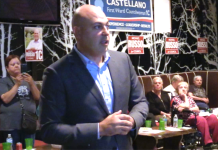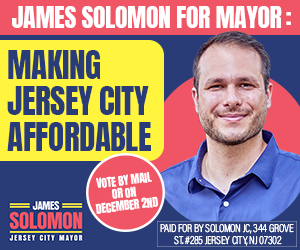In an editorial, Emeritus Professor of Finance at Ramapo College Murray Sabrin, Ph.D. outlines how Jersey City could be on the cusp of an economic boon.
Jersey City has been on a winning streak lately.
Its population is on the rise, it has several multi-hundred-million dollar mixed use developments under construction, and its tech sector is growing.
Perhaps most impressively, Jersey City has landed a string of major corporate headquarters this year, including Casio — the world’s largest watch manufacturer — and Hexaware — an up-and-coming AI and IT firm.
Such achievements often come with a huge asterisk, but Jersey City has managed to do what too many places in New Jersey can’t: foster organic economic growth without shelling out sweetheart tax breaks.
But there’s a storm brewing just down the Turnpike. While Jersey City is leaning into innovation, Trenton and Washington continue to impose the same outdated playbook that’s been driving residents and entrepreneurs out of the state for years.
This is what Jersey City residents have come to expect from Washington.
From antitrust cases that hurt Jersey City small businesses — like the one against Visa, which the Biden administration issued for political reasons, claiming without any evidence that its standard debit card fees “raise the price of nearly everything” — to the EPA’s onerous stormwater runoff and wetlands regulations, which make Jersey City’s brownfield redevelopment program more expensive and slow, D.C. has never seemed to keep the city’s interests in mind when making decisions. But Trenton should know better.
Thanks to Trenton, Jersey City entrepreneurs continue to face opaque licensing rules for emerging sectors, non-competitive tax rates that hit new tech firms hardest, and economic development models that rely on subsidies, not ecosystem-building.
The city’s economic challenges aren’t a mystery: high taxes, byzantine regulations, and a state bureaucracy that strangles enterprise.
There are three steps local and state decisionmakers can take to really help improve the city’s business outlook:
First, flatten and simplify the tax code, especially for entrepreneurs.
According to The Tax Foundation, New Jersey has the second-worst tax regime of any state in the nation, including some of the country’s highest property taxes, its highest-rate corporate income tax, a downright hostile approach to international income, and “some of the nation’s worst-structured individual income taxes.”
Second, roll back licensing regimes.
New Jersey imposes massive barriers to entry on a huge swath of professions, earning a bottom-ten ranking for occupational licensing.
These barriers supposedly exist to protect consumers from shoddy work, but licensing boards are often stacked with industry incumbents who have every incentive to stop new competitors from entering the market.
Third, end targeted subsidies that distort markets and reward political favorites.
Whether it’s film and television, AI, green energy, or convincing Party City to move their headquarters to the Garden State, the massive tax credits Trenton offers increase the burden on public services without a corresponding increase in revenue.
The governor gets to attend swanky ribbon cuttings and talk up his pro-business bona fides while hardworking families pay the price.
Fourth, Jersey City’s congressional representatives should express their displeasure with the federal edicts that have made it harder to do business in Jersey City.
Because if national brands like Visa can be targeted for political reasons, so can fintech innovators and payment startups setting up shop in the city.
Some of the Jersey City’s biggest growth sectors could grind to a screeching halt. The Jersey congressional delegation must do everything it can from preventing this from happening.
Free enterprise depends on consumer choice and market feedback, not the kind of bureaucratic second-guessing that power-hungry policymakers prefer.
It’s time for New Jersey to recommit to economic liberty, and abolish unwarranted regulations which reduce prosperity.
Murray Sabrin, Ph.D. is Emeritus Professor of Finance at Ramapo College of New Jersey.











The Democratic Party is the party of high taxes and over regulation.
Good opinion. The property taxes in Jersey City are just ridiculous.
Will never happen. NJ State Legislature is a Democrat party soft dictatorship. One party rule.